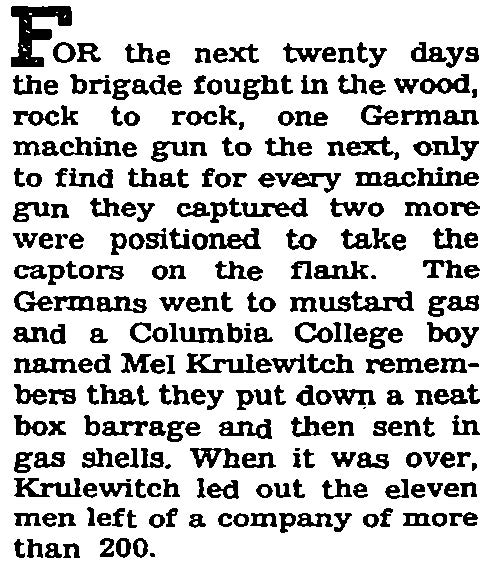I’m going to tweet out a story from the last day of World War I that you won’t believe.
But it really did happen. (1/11)
But it really did happen. (1/11)
It begins in April, 1917, when my grandfather, Mel Krulewitch, drops out of Columbia Law School to enlist in the U.S. Marine Corps. He joined up because he saw an ad on a bus that said: “Join the Marines. First to Fight!” (2/11)
Grandpa wasn’t impressed with the motley gang he found at the U.S. Marine Corps recruiting station. “Reality hit him abruptly. His fellow recruits left him aghast. ‘Many of them needed a bath,’ he later recalled.” (3/11)
.google.com/search?tbm=bks…
.google.com/search?tbm=bks…
Things got worse – and more difficult – down at Parris Island. The base wasn’t prepared for so many new recruits. After basic training everyday the new recruits were pressed into labor gangs doing construction & hauling every night (4/11)
books.google.com/books?id=M08CM…
books.google.com/books?id=M08CM…
So getting to France & war in early 1918 was a relief. Like other Marines, he was eager to go into battle. Then Belleau Wood happened. Here he talks about Belleau Wood combat in a 1964 @BBC documentary (5/11)
He entered Belleau Wood with a company of over 200 men. Here @nytimes (“A First-Class War,” 8 June 1958) describes the ordeal. He made sergeant for being 1 of 11 Marines in his unit to survive the battle (6/11) 

Months of combat ensued. Until November 10, 1918, when rumors of an armistice were followed by delivery of hot & delicious meals. Everyone was happy until an officer ordered them to load up – they were attacking the Germans at dawn (7/11) 

That day – November 11, 1918 – was Grandpa’s 23rd birthday. He spent the early morning in combat, covering a bridgehead attack while enduring shelling (8/11)
Then it happened: a bomb landed directly in the middle of his company. Everyone knew they were about to die: “Even if cover had been available, none could have reached it in time. Fascinated, immobile, they could only await the end,” he remembered (9/11)
But it was a dud. The German artillery shell didn’t explode. He and the other Marines survived. (10/11) 

Just a few hours later, World War I ended. Here’s how it ended for him (from his autobiography, titled, "Now That You Mention It" (1973)) (11/11)




• • •
Missing some Tweet in this thread? You can try to
force a refresh




